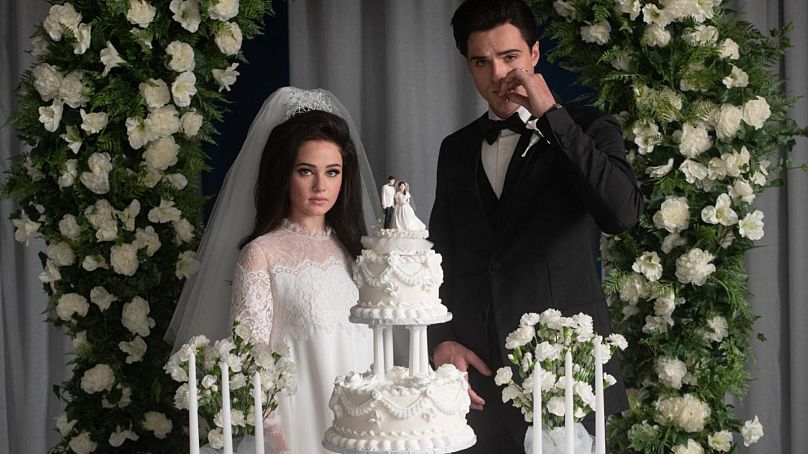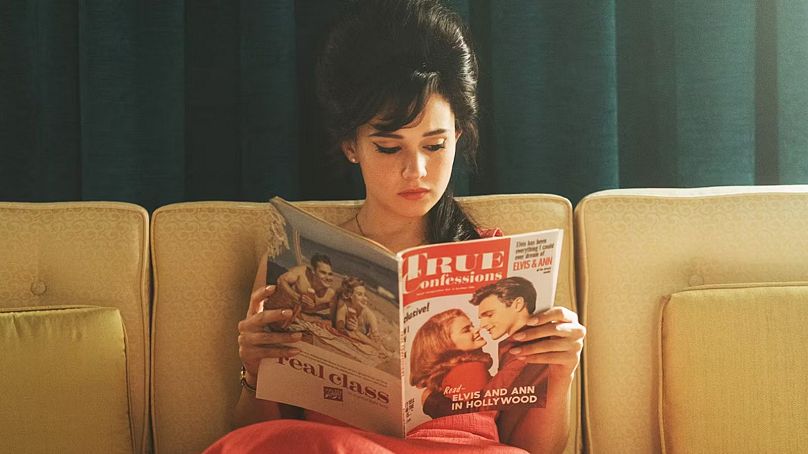Sofia Coppola's film is a triumph, not only as a rumination on loneliness and self-realisation, but as a biopic which, to quote the King’s mantra, more than takes care of business.
47 years after his death, Elvis’ impact on popular culture is still alive and well.
There was Baz Lurhmann’s 2022 OTT biopic Elvis; the recent news that Presley fans will be able to see a life-sized digital version of Elvis performing on stage in the UK for the first time later this year; and now Sofia Coppola’s film, Priscilla.
Adapted from Priscilla Presley’s 1985 memoir, “Elvis and Me”, this far more understated movie focuses less on the “King of Rock and Roll” and more on Priscilla Beaulieu (Cailee Spaeny), the young woman Elvis (Jacob Elordi) met when he was a 24-year-old soldier stationed in Germany and she was just 14.
The pair strike up a relationship when they meet at a house party. The fairytale soon morphs into a chaste relationship then a marriage, which sees Priscilla move to Graceland.
While Priscilla could have been another by-the-numbers Wiki-checklist biopic, Coppola instead delivers a beautifully told, melancholic and thoughtful fable, which doubles as a cautionary tale. Those expecting a racy biopic filled with Elvis tunes will be disappointed, as this is more the portrait of a young woman’s tragic marriage rather than a scandal-fuelled romp. We follow as young love turns sour, and get to see a side of the rock star that is rarely explored through a lopsided game of control, in which Elvis grooms his wife - even from afar.
Both Spaeny and Elordi are bewitching throughout. The former eclipses the latter by design, as her cloistered life is the primary focus of this rather unique biopic. Spaeny embodies Priscilla through several stages of her life, and considering it is her first major leading role – one which earned her the Volpi Cup for Best Actress at last year’s Venice Film Festival – her work is remarkable. This journey to self-discovery only works because the 25-year-old actress is up to the task, and she never fails to be impactful.
As for Elordi, he doesn't turn the King into an all-out villain, and the film is stronger for it. He is a little boy lost who uses the fact that his bride wasn’t legally of age to turn her into a virginal totem of purity, to better feed his Messiah complex. His toxicity as a controlling man looking for a blank slate is perfectly handled, without resulting to moustache twirling.
Considering that Coppola has often gravitated towards lonely heroines trapped in gilded cages and seeking agency (The Virgin Suicides, Lost in Translation, Marie Antoinette), she was not only perfect to bring this story to the screen, but may have delivered her loneliest protagonist yet.
Her approach to the character, buttressed in no small way by the work of cinematographer Philippe Le Sourd and the woozy landscapes he creates, perfectly highlights that the ubiquitous biopic genre need not adhere to stale templates. It is a genre that can explore complex dynamics without reducing its protagonists to broad strokes – something all too frequent when dealing with iconic cultural figures.
As such, Priscilla is a triumph not only as a rumination on loneliness and self-realisation, but as a biopic which, to enhance Elvis' mantra, more than takes care of business.
Priscilla is out in cinemas now.













